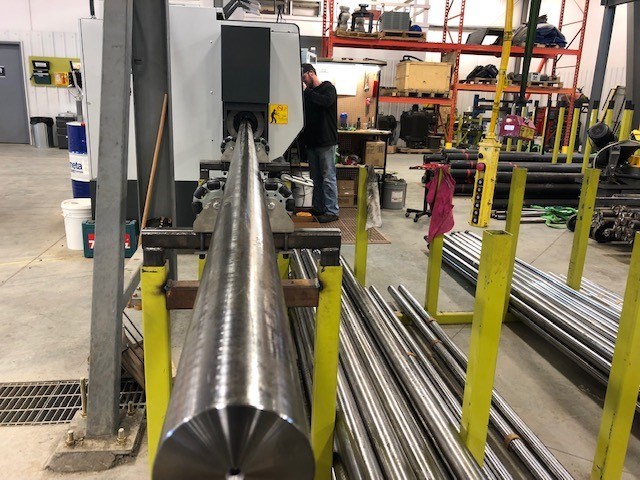Lloydminster – The Progressive cavity pump changed Lloydminster’s oilpatch nearly 40 years ago, and a manufacturer of those pumps, MANTL, set up shop in the border city three-and-a-half years ago.
Jordy Gerling, vice president of Canadian operations and a partner in the business since day 1.
“We have 11 workers out of the office,” he said on Dec. 4 by phone. The majority are focused on manufacturing, while the remainder do field service work.
Asked why they chose Lloydminster to establish their manufacturing facility, Gerling replied, “We are in Lloydminster because we looked at where the heart of the usage is, and where the heart of manufacturing was.”
That mean there were a lot of people in Lloydminster with experience in progressing cavity pumps (PCPs). There had been three other manufacturers of PCPs in Lloydminster, but two have since relocated to Edmonton.
There are two key components to progressing cavity pumps - the stator, which is a metal barrel lined with an elastomer, and the rotor, which is turned by sucker rods from the surface, driven by a top drive.
These pumps function similar to a grain auger, with the pump’s rotor work to the flighting in an auger. The stator is like the barrel of the auger.
The stators have their elastomer-to-metal injection done in Germany. The elastomer is key, as downhole conditions change, so does the elastomer requirement going into these wells. Sand and other solids require a softer elastomer, while aromatics require a harder elastomer with better chemical resistance.
In Lloydminster, they make the rotors from raw metal.
Gerling said, “In Lloydminster, as a standard, we are turning raw 4140 steel into a usable rotor. We’re also experimenting with stainless steel and other materials for coatings as well.”
They also do customization of the stator element, machining it and adding length to them which, in turn, adds lift to that particular series of pump, while in operation.
MANTL is partnered with an outfit out of Edmonton on its drive heads.
“We do all the final assembly in our Sedgewick branch,” he said.
That’s by design, distributing the manufacturing throughout the company’s footprint. Gerling called it “level loading all our field locations with alternative functions,” which allows them to get better use out of their staffing.
MANTL doesn’t manufacture sucker rod or continuous rod, but it does sell those products.
The Lloydminster facility focuses on manufacturing, as opposed to field sales.
PCPs with elastomers don’t see usage in high-temperature thermal projects. Without a lot of action happening in the Lloydminster area, and the largest oil producer there focusing on thermal extraction, the local market is affected.
“It’s hurting, yes,” Gerling said, when asked about that.
“It’s been on our radar for three-and-a-half years.”
So how will they deal with the challenge of the local conversion from CHOPS to thermal?
“When we set out and started planning how this company was going to evolve, we looked at spaces to manufacture and resources. We chose Lloydminster for that. But we also made a decision going into Lloydminster. It’s a tough market, even in the best of times. Lots of competition. All the manufacturers are here. There’s a lot of wells here. We made the decision to come here knowing full well we don’t necessarily want to chase that market Year 1, 2, 3 or 4, but someday we’re going to have to chase it.
“So let’s get good at what we’re doing. We’ll be best set up in three, four years, to start chasing the biggest PCP market in the world. It’s questionable that it is, today, but with the recovery for price differentials, it’ll still be a heavy target for PCP.
“Has it changed in the last four years? Yes, but I still think we made the right decision,” Gerling said.
MANTL also sells internationally into 12 countries. A few include Columbia, Venezuela, U.S.A., Iran and Australia, and Romania.
Early in their second year they were shipping to Romania and Australia. “We took some time to break down the walls in the U.S. PCPs are not the artificial lift of choice in the U.S. It’s a small, small sampling of artificial lift,” he said.
Failures with early designs many years ago have soured the market south of the border.
MANTL saw “huge growth” in its first few years, but he expects this year things will level out.
“We’re opening up micromanufacturing centres in other countries. We’re looking at international growth opportunities.”
They set up six domestic field stores in the first three years. “We set up our first micromanufacturing facility in Columbia last year. We’re in the process of setting one up in Texas this year. We’re looking potentially at Oman to do another one,” Gerling said.
In Australia they’re working with a partner to service the market. There, PCPs are used for dewatering coal seam gas. A few years ago, Australia was installing up to 200 PCPs a month, even before the pipeline infrastructure was in place to take away the eventual gas that would be produced.
“I feel this is MANTL’s opportunity,” he said, noting service will be an important part of it. They recently sent a test bench to Australia.
“Our products are known. Our people are known,” he said, adding that working out of Canada gets MANTL a checkmark right out of the gate.
“We have produced volumes of product out of our shop that was unheard of in places that I’ve been, working for the competition.
“We’re doing it with a third of the guys that I’ve ever been exposed to in any of my previous jobs with competitors. We’re a single cell facility producing an outrageous amount of product with the minimum amount of people, and we’re doing it very well,” Gerling concluded.




